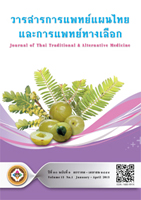Evaluation of A Folk Science Lesson on Lanna Local Rituals for Health Promotion in HIV/AIDS Patients
Main Article Content
Abstract
The purpose of this study was to develop a folk science lesson about Lanna (northern) local rituals for health promotion in HIVAIDS patients and assess its learning effectiveness. The study sample consisted of 49 HIV/AIDS patients selected using the purposive sampling method. The research instrument was a questionnaire on HIVAIDS patient’s knowledge and encouragement gained from the Lanna local ritual lesson. Data were analyzed to determine pre- and post-learning effectiveness (E1/E2) ratio and paired t-test value.
The results showed that the E1/E2 ratio or score of HIVAIDS patients’ knowledge before and after taking the Lanna local ritual lesson was 80.01/86.78. The post-learning achievement score was significantly higher than the pre-learning score at the statistical significance level of 0.05 (p-value = 0.002). The study suggested that local health agencies should adopt the Lanna local ritual lesson on HIV/AIDS patient’s health promotion as a ritual healing approach to promote the use of Lanna local wisdom for health promotion of local residents.
Article Details
References
2. Wessner Dr. The Wisdom of Whores. Bureaucrats. Brothels and the Business of AIDS.W. W. Norton & Co: New York; 2008.
3. ยิ่งยง เทาประเสริฐ. วิถีการดูแลสุขภาพในระบบการแพทย์พื้นบ้านล้านนา. เชียงราย: สถาบันราชภัฏเชียงราย; 2546.
4. อำพันธ์ เรียงเสนาะ, หรรษา เศรษฐบุปผา, สิริลักษณ์ วรรธนะพงษ์. ภูมิปัญญาพื้นบ้านล้านนาในการ ดูแลด้านจิตใจของผู้ป่วยเอดส์: ลักษณะของภูมิปัญญาพื้นบ้านล้านนา. พยาบาลสาร; 2550. หน้า 158-71.
5. โกมาตร จึงเสถียรทรัพย์. หลักการพื้นฐานของสุขภาพองค์รวมในการบำบัดทางเลือกและสุขภาพองค์รวม. [อินเตอร์เน็ต]. 2547. [อ้างถึงวันที่ 10 สิงหาคม 2557]. เข้าถึงได้จาก: https://www.dtam.moph.go.th
/alternative /downloads/altertreatment.pdf
6. มนตรี แย้มกสิกร. เกณฑ์ประสิทธิภาพในงานวิจัยและพัฒนาสื่อการสอน: ความแตกต่าง 90/90 standard และ E1/E2. วารสารศึกษาศาสตร์. 2551;19(1):1-16.
7. มนัชยา มรรคอนันตโชติ. การศึกษาการดูแลผู้ติดเชื้อเอดส์แบบองค์รวมผสมผสานกับการแพทย์แผนปัจจุบัน. [อินเตอร์เน็ต]. 2540. [อ้างถึงวันที่ 2 สิงหาคม 2557]. เข้าถึงได้จาก: https://www.ittm.dtam.moph.go.th/Service /project_data/2540_05.doc .2556
8. Mcevoy L, Duffy A . Holistic practice – A concept analysis. Nurse Education in Practice. 2008;8(6):412-19.


